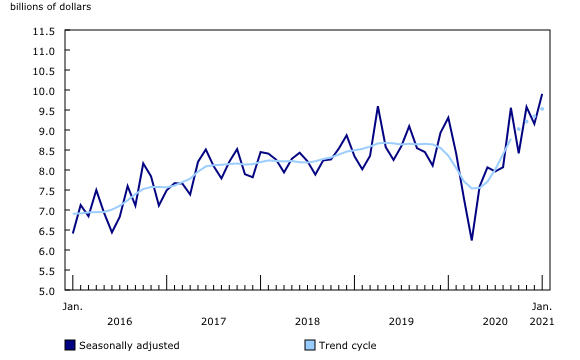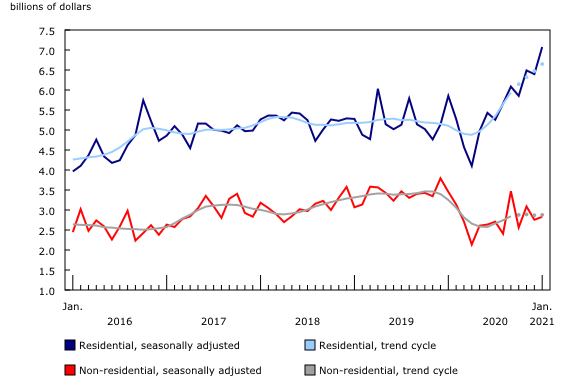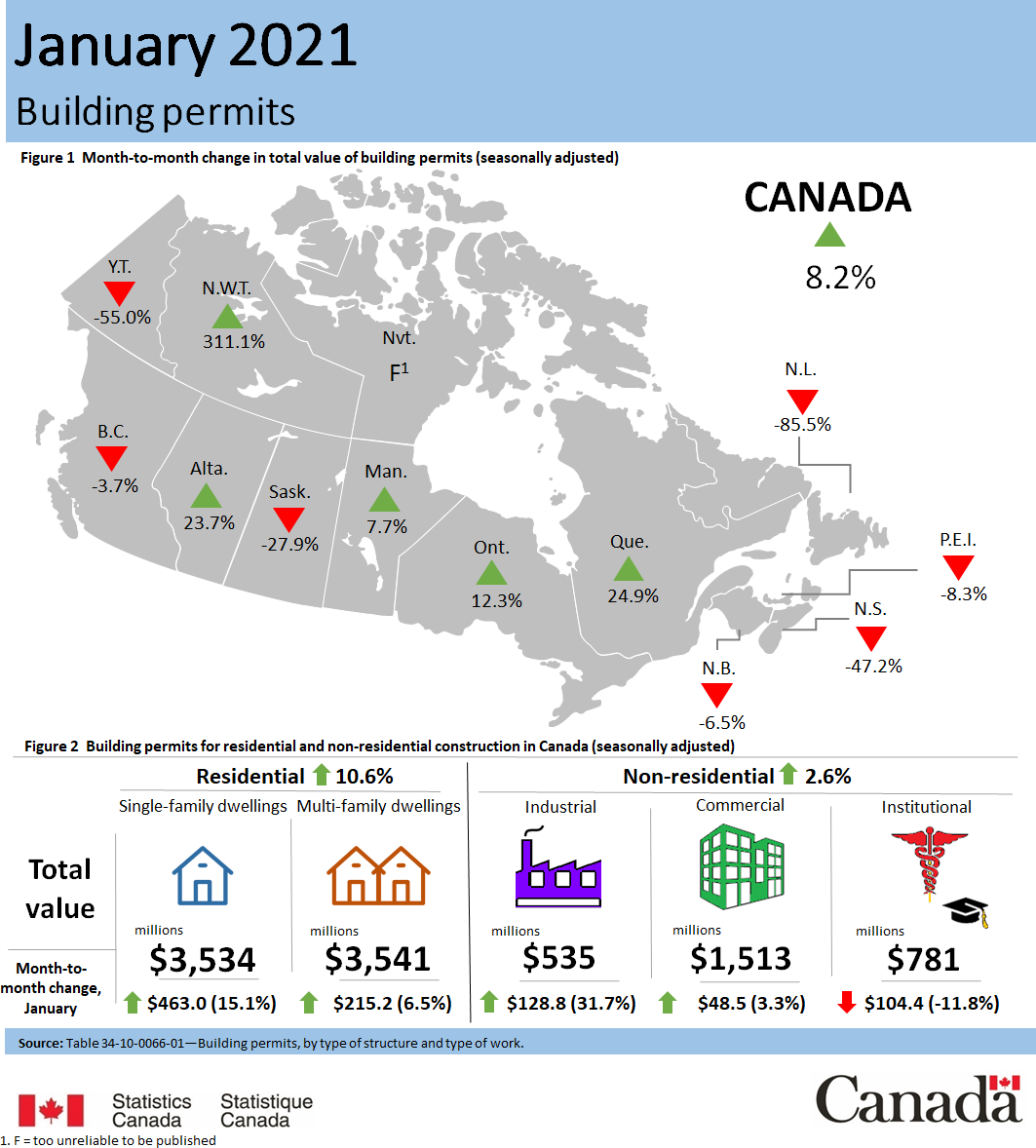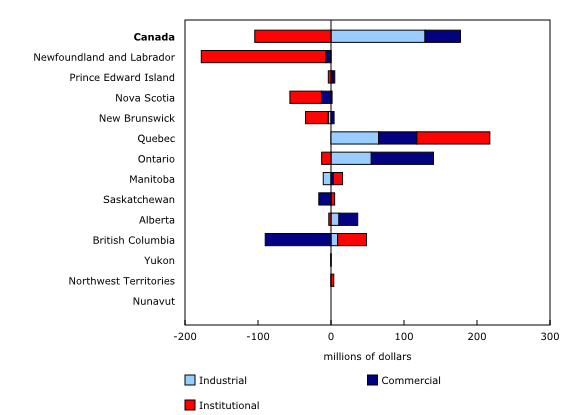Building permits, January 2021
Archived Content
Information identified as archived is provided for reference, research or recordkeeping purposes. It is not subject to the Government of Canada Web Standards and has not been altered or updated since it was archived. Please "contact us" to request a format other than those available.
Released: 2021-03-03
$9.9 billion
January 2021
8.2% 
(monthly change)
$29.9 million
January 2021
-85.5% 
(monthly change)
$40.9 million
January 2021
-8.3% 
(monthly change)
$132.2 million
January 2021
-47.2% 
(monthly change)
$125.4 million
January 2021
-6.5% 
(monthly change)
$2,243.1 million
January 2021
24.9% 
(monthly change)
$4,326.9 million
January 2021
12.3% 
(monthly change)
$311.3 million
January 2021
7.7% 
(monthly change)
$121.4 million
January 2021
-27.9% 
(monthly change)
$1,129.8 million
January 2021
23.7% 
(monthly change)
$1,435.5 million
January 2021
-3.7% 
(monthly change)
$2.4 million
January 2021
-55.0% 
(monthly change)
$5.2 million
January 2021
311.1% 
(monthly change)
F
January 2021
F
(monthly change)
January rang in the new year with a record high total value of building permits issued, rising 8.2% to $9.9 billion and surpassing the previous record of $9.6 billion set in April 2019. These gains were driven primarily by the residential sector.
Residential sector surges to new heights
The value of permits issued in the residential sector increased 10.6% to $7.1 billion in January—rising past the previous peak of $6.5 billion posted two months earlier. Provincial highs were reported in Ontario, Quebec, New Brunswick and Manitoba.
The majority of the rise in the residential sector was attributable to single-family homes, which climbed 15.1% to a record $3.5 billion—the eighth increase in nine months. Continuing the upward trend observed since October, the value of single-family permits issued in Quebec soared, rising 40.3%. Much of the gain came from regions outside of census metropolitan areas (CMAs).
Multi-family permits increased 6.5% to $3.5 billion, mainly driven by higher construction intentions in Ontario (+17.1%), where several permits in excess of $100 million were issued for condominium apartments in the CMA of Toronto. Conversely, the value of multi-family building permits in Quebec fell for a fifth consecutive month in January.
Non-residential sector up modestly in January
The total value of permits issued for non-residential buildings rose 2.6% to $2.8 billion in January after a 10.8% drop in December.
Following three consecutive monthly declines, industrial permits bounced back to average 2020 levels, increasing 31.7% to $535 million in January. High-value permits for an Amazon warehouse in Lachine, Quebec, and for two Eglinton Crosstown light rail transit stations in Toronto helped reverse the downward trend.
The value of commercial permits increased 3.3% to $1.5 billion. Six provinces posted increases in this component, led by Ontario (+14.7%) and Quebec (+20.4%).
Within the institutional component, municipalities issued permits worth $781 million, 11.8% lower than December. Values in Newfoundland and Labrador returned to typical levels following a $170 million hospital renovation permit issued in Corner Brook the previous month, pushing the national total lower.
To explore the impact of COVID-19 on the socioeconomic landscape, please consult the Canadian Economic Dashboard and COVID-19.
For more information on housing, please visit the Housing Statistics Portal.
Statistics Canada has a Housing Market Indicators dashboard. This web application provides access to key housing market indicators for Canada, by province and by CMA. These indicators are updated automatically with new information from monthly releases, giving users access to the latest data.
Note to readers
Unless otherwise stated, this release presents seasonally adjusted data, which facilitate month-to-month comparisons by removing the effects of seasonal variations. For information on seasonal adjustment, see Seasonally adjusted data – Frequently asked questions.
The Building Permits Survey covers over 2,400 municipalities, representing 95% of the Canadian population. The communities representing the other 5% of the population are very small, and their levels of building activity have little impact on the total for the entire population.
Building permit data are used as a leading indicator of activity in the construction industry.
The value of planned construction activities presented in this release excludes engineering projects (such as waterworks, sewers or culverts) and land.
For the purposes of this release, the census metropolitan area of Ottawa–Gatineau (Ontario and Quebec) is divided into two areas: the Ottawa part and the Gatineau part.
Unless otherwise specified, the highlights refer to seasonally adjusted current dollars and are ranked in terms of dollar change rather than percentage change.
Building components
Single-family dwellings: Residential buildings containing only one dwelling unit (for example, single-detached house, bungalow, linked home [linked at the foundation]).
Multi-family dwellings: Residential buildings containing multiple dwelling units (for example, apartment, apartment condominium, row house, semi-detached house).
Industrial buildings: Buildings used in the processing or production of goods, or related to transportation and communication.
Commercial buildings: Buildings used in the trade or distribution of goods and services.
Institutional and government buildings: Buildings used to house public and semi-public services, such as those related to health and welfare, education, or public administration, as well as buildings used for religious services.
Revision
Unadjusted data for the current reference month are subject to revision based on late responses. Data for the previous two months have been revised. Seasonally adjusted data for the previous three months have also been revised.
Trend-cycle estimates have been added to the charts as a complement to the seasonally adjusted series. Both seasonally adjusted data and trend-cycle estimates are subject to revision as additional observations become available. These revisions could be large and could even lead to a reversal of movement, especially at the end of the series. The higher variability associated with trend-cycle estimates is indicated with a dotted line on the chart.
For information on trend-cycle data, see the StatCan Blog and Trend-cycle estimates – Frequently asked questions.
Next release
Data on building permits for February will be released on April 1.
Contact information
For more information, or to enquire about the concepts, methods or data quality of this release, contact us (toll-free 1-800-263-1136; 514-283-8300; STATCAN.infostats-infostats.STATCAN@canada.ca) or Media Relations (613-951-4636; STATCAN.mediahotline-ligneinfomedias.STATCAN@canada.ca).
- Date modified:






